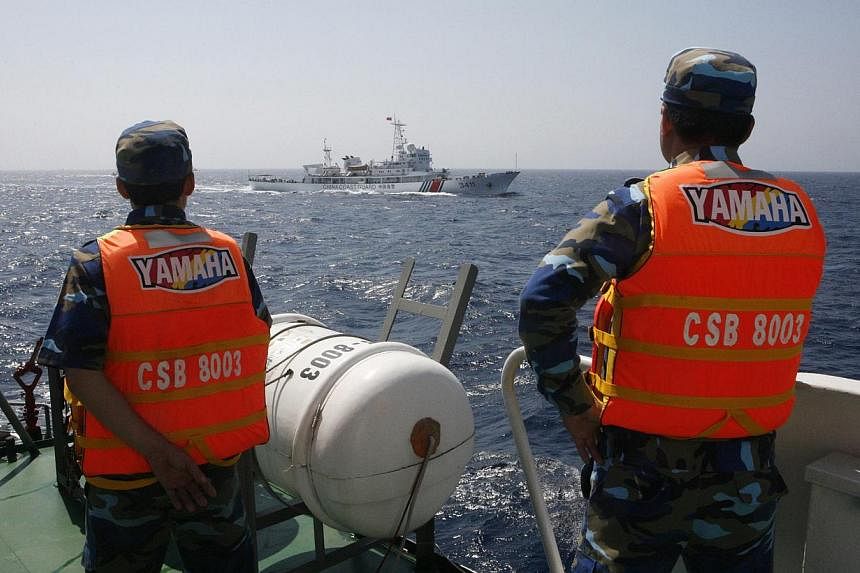Before joining Asean in July 1995, Vietnam dispatched a fact-finding team headed by former deputy foreign minister Vu Khoan to the Jakarta-based Asean Secretariat to assess its membership and the impact on Asean-China relations.
The Vietnamese team wanted to know what Asean would do to defend itself against an outside power. The team went away with the understanding that Asean would do everything it could to protect a member state. After nearly two decades of membership, Vietnam is now testing the implied promise of collective power.
At the latest Asean Summit in Myanmar last month, Asean foreign ministers issued a joint statement expressing "serious concerns" over recent incidents in the South China Sea.
Even though the statement did not single out China or specifically mention any disputed island chain, it came on the heels of the Philippines' arrest of 11 Chinese fishermen for turtle-poaching in a shoal near the disputed Spratly Islands, as well as China's placement of an oil rig in contested waters near the Paracel Islands.
It was the second time Asean had issued such a statement since Myanmar took over the grouping's chairmanship five months ago. The first one was issued during the Foreign Ministers' Retreat in January. More statements urging all parties to exercise self-restraint and act in accordance with international law are expected in the second half of this year.
For years, Asean has avoided wading into the South China Sea territorial disputes to maintain its neutrality. Four of its members - Vietnam, the Philippines, Malaysia and Brunei - have overlapping claims with China.
From Vietnam's perspective, Asean has taken a giant step in overcoming the decade-old psychological barrier to declaring its common position on the South China Sea issue.
Asean leaders are determined not to repeat the 2012 fiasco in Cambodia when its foreign ministers failed to issue the customary joint communique due to differences over mentioning the maritime disputes in the statement.
Throughout Asean's history, whenever external threats or crises have knocked on its doors, the members have acted together. China's recent moves in the South China Sea have prompted Asean to band together and speak with one voice.
There is also a subtle but significant shift in Indonesia's position. It is moving away from its traditional role as a facilitator in the resolution of the South China Sea dispute to that of an active party.
In recent months, however, Jakarta has become critical of Beijing's assertiveness. For instance, Indonesia was the only Asean country that told Beijing earlier this year that Jakarta would not accept a Chinese air defence identification zone (ADIZ) over the South China Sea. China declared an ADIZ over the East China Sea last November.
Judging from Hanoi's comments and the statements released through its embassies in Asean, Vietnam has adopted a very distinctive strategy in dealing with China over their maritime disputes.
First, and most importantly, Vietnam has made every effort to maximise the role of Asean. Vietnam views Asean as a high-value asset in dealing with major powers. Indeed, the country joined Asean three months after the grouping released its first strongly worded joint communique against China's occupation of Mischief Reef in the Spratlys. That helps explain why Vietnam has preferred not to follow the example of the current Philippine government, which has taken the view that Asean would not be able to help much on matters involving territorial disputes with China.
Back in 1992, the Philippines was instrumental in pushing for the first document of conduct in the South China Sea, known as the Asean Declaration on South China Sea. However, under the current Aquino administration, Manila has not paid sufficient attention to its Asean friends. For instance, the Philippines did not consult Asean on its move to seek international arbitration for its territorial disputes with Beijing.
Vietnam, on the other hand, is likely to continue emphasising Asean's solidarity and support as China and Asean prepare to meet for the next round of the working group-level discussions on the code of conduct for the South China Sea. The discussions are scheduled for June 24-25 in Bali.
Hanoi has also indicated that it may consider taking the dispute to the United Nations Permanent Court of Arbitration - but not so soon.
Apparently, this is a strategic move. Both Vietnam and China share the view that the use of UN mechanisms must be a last resort. That was why both sides were not keen to accept UN chief Ban Ki Moon's offer to play a mediating role. After all, the leaders of the communist parties of Vietnam and China, which have maintained cordial ties, have not yet met to discuss the issue. Their dialogue so far has taken place at a low level.
Another of Vietnam's strategies involves strengthening cooperation with countries that could augment its international standing and bargaining power vis-a-vis China. Both the United States and Japan are stepping up maritime security cooperation with Vietnam and have pledged to provide a number of patrol boats to Vietnam. Last year, Vietnam also became a comprehensive partner of the US.
Vietnam remains cautious in commenting on its expanding strategic links with the US and Japan, knowing full well the potential danger of overplaying this nascent but strategic relationship. One possibility is that at Vietnam's highest echelons of power, there is still no consensus on this realpolitik approach. Some quarters may still prefer the status quo regarding ties with China.
The writer is assistant group editor of the Nation Media Group in Thailand, which publishes the English-language daily The Nation.

